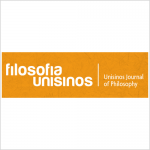The final end of imagination: On the relationship between moral ideal and reflectivity in Immanuel Kant’s Critique of the Power of Judgment
Vol 18, No 2 (2017) • Filosofia Unisinos - Unisinos Journal of Philosophy
Autor: Moran Godess Riccitelli
Resumo:
One main quandary that emerges in the context of Immanuel Kant’s moral ideal, The Highest Good, is that on the one hand Kant sets it as a moral demand, that is, as a principle that must be comprehended as an attainable end for man in practice while, on the other hand, it is set as a moral ideal, i.e. as something that cannot be concretized and realized within the empirical world. The main goal of this paper is to argue for the realizability of the moral ideal by means of the principle of reflective judgment as a form of judgment that in fact clarifies human limitation. I assert that the very recognition of this limitation constitutes the possibility for hope in that ideal, or for striving towards it, and that this striving is the only way that the moral ideal can be concretized. I examine man’s recognition of self-limitation as a response to the moral demand to realize the moral ideal and the necessity of the power of imagination for this, used reflectively.
ISSN: ISSN: 1984-8234
Texto Completo: http://revistas.unisinos.br/index.php/filosofia/article/view/fsu.2017.182.05
Palavras-Chave: culture,final end,Highest Good,imagination,ho

Filosofia Unisinos - Unisinos Journal of Philosophy
The journal Filosofia Unisinos - Unisinos Journal of Philosophy is published once every four months by Universidade do Vale do Rio dos Sinos.
Articles must be original, unpublished, and not under consideration for publication anywhere else and can be written in Portuguese, English or Spanish
Filosofia Unisinos - Unisinos Journal of Philosophy prints articles, translations and critical book reviews. It also reprints papers that are considered fundamental to the area when authorized written permission is given by the original publisher.
